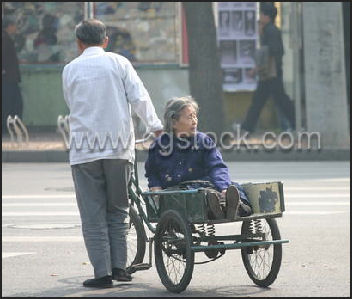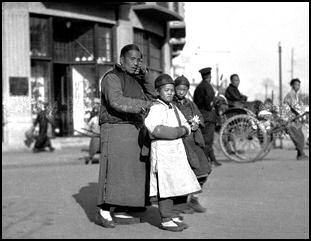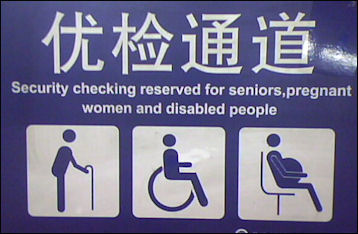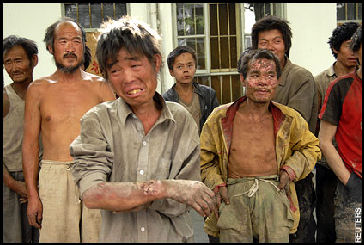HANDICAPPED PEOPLE AND DISCRIMINATION IN CHINA
 China is home to the world’s largest disabled population. The are 83 million disabled people in China, with a million in Beijing alone. In the 1990s, 60 percent are illiterate, 40 percent are unemployed and nearly half can not find spouses. There are only 250 schools for handicapped children with a total enrollment of only 100,000 students. There are 4.2 million children disabled by congenital diseases alone.
China is home to the world’s largest disabled population. The are 83 million disabled people in China, with a million in Beijing alone. In the 1990s, 60 percent are illiterate, 40 percent are unemployed and nearly half can not find spouses. There are only 250 schools for handicapped children with a total enrollment of only 100,000 students. There are 4.2 million children disabled by congenital diseases alone.
“The notion that people with disabilities should be mainstreamed into education and ordinary jobs is still new in China,” Sharon Lafraniere, New York Times. “The disabled seem strangely absent from the streets of Beijing or Shanghai. Better than two in five disabled adults in China are illiterate, according to a 2006 survey by the China Disabled Persons’ Federation, a government agency. The average salary of a disabled worker is less than half that of a non-disabled worker. Only one-third of disabled people who need rehabilitation services have access to them, the survey found. Professionals trained to aid the disabled are desperately scarce: Europe has 185 times as many physiotherapists per person as China, according to a 2008 study by Renmin University in Beijing.” [Source: Sharon Lafraniere, New York Times, March 3, 2010]
Handicapped people are routinely denied jobs, driver licenses and places in universities because of their disabilities although there are laws on the books that are supposed prevent such practices. Discrimination laws are undermined by laws that allow companies and government institutions to reject people deemed physically unsuitable.
Students with a difference in leg length more than 5 centimeters or a spinal curve of more than four centimeters are not allowed to major in subjects such as geology, civil engineering, veterinary science, main science and forensic medicine. In some case they are note even allowed to take short courses in cooking, sculpture or archeology.
Many Chinese believe that handicapped people have received their disabilities as a punishment or are victims of bad luck or evil spirits. Many have been abandoned by their parents. Restaurant often refuse to admit people with deformities out of fear they will scare off customers.
On social worker in Beijing told the Washington Post, “Chinese government and society tends to treat the disabled with condescension, treating them like a charity case instead of giving them equal respect.” Many people blame the breakdown of Confucian values as a result of Communist political campaigns for the lack of empathy and compassion towards those with problems.
“Still, some indicators are improving. The number of disabled people receiving low-income benefits jumped to more than seven million in 2008 from fewer than four million in 2005. Nearly three in four children with disabilities attended school in 2008, compared with about three in five just two years earlier. The number of disabled students in universities and technical colleges in 2008 increased by 50 percent over 2006. Still, they amounted to a mere handful, just one out of every 5,000 students.”
The laws covering the rights of handicapped were revised and improved in mid 2000s after several government agencies banded together with the support of members of the public to change the laws. The Chinese government spent $1.7 million to have braille signs and wash basins, toilets and handrails that can be use by people in wheelchairs in the new airport terminal that opened up in 2008. But the most parts China are still woefully lacking in facilities for the disabled, Most buses and taxi cabs are are not wheelchair friendly. When there are wheelchair ramps they are often too steep or blocked by bicycles.
HEALTH AND HEALTH CARE IN CHINA factsanddetails.com ; HEALTH IN CHINA: STATISTICS, PROBLEMS AND CUSTOMS factsanddetails.com; OBESITY, MALNUTRITION AND EATING DISORDERS IN CHINA factsanddetails.com; MENTAL HEALTH IN CHINA: HISTORY, FREUD, LACK OF CARE AND HIGH NUMBERS factsanddetails.com
See Dwarf Theme Park
Blind and Deaf People in China

Blind man in the 1920s
There are around 12 million blind or visually impaired people in China. Only about 5 percent of the blind in China receive any kind of formal schooling. There are only 105 schools for China's 5 million sight-impaired people. In these schools children sleep nine to a room. Often, the only job opportunities open to many blind are positions as acupuncturists or masseuses.
Blind people enjoy some benefits. They are exempt from school fees and receive financial aid for starting up businesses. In Beijing, an effort has been made to eliminate uneven sidewalks and floor in public buildings. Still, China is far behind other industrialized countries in the care it offers t the visually impaired.
As of early 2008, there were only five guide dogs for the blind in all of China, four in Dalian and one in Beijing. A partially-sighted, former Paralympics athlete with the guide dog in Beijing was unable to go out with it because of a Beijing city ordinance that prevents residents from keeping large dogs.
Deaf people have more opportunities. The Chinese Disabled Person’s Art Performing Troupe performs the Qianshou Kaunyin (Bodhisattva with a 1,000 hands) is made of young, attractive deaf women. See Dance.
Sterilization, Marriage Ultrasound and Handicapped People
A new law that went into effect in June 1995 banned marriages between people "with certain genetic diseases of a serious nature" unless they agreed to sterilization or long-tern contraception first. The measure also requires doctors to "advise" couples to get an abortion if they detect a hereditary disease, infectious disease or abnormal fetus. In a speech supporting the new legislation the Chinese Minister of Public Health said, " China now has more than 10 million disabled people who could been prevented through better controls."
Eugenic laws banning childbirth by the mentally retarded people were passed in 1988 in the Gansu province, where rates of cretinism are high. Many government officials also advocate sterilization for the mentally ill. In the early part of the 20th century, at least 16 states in the U.S. passed eugenic laws that authorized the sterilization of the mentally retarded, epileptics and people judged as insane. In the United States and many other countries today prospective parents can screen their unborn children for congenital defects and chose to abort the fetus if there is a problem, but unlike China, where the state decides, the choice is up to the individual.

Handicapped Chinglish
Ultrasound is used to screen deformed and retarded children. One man with a physically disabled 10-year-old son told Newsweek he would have had his son aborted if had known about his condition before he was born. "My son is not a good contribution to the country or society," he said.
A new law that has been discussed wants "to control the reproduction of people with venereal disease, hepatitis and other diseases." One Chinese doctor told the New York Times that he was shown a training video advocating the sterilization of deaf people before marriage to prevent the possibility of transmitting deafness to their offspring. "The video showed a woman who was deaf holding up papers showing that she had been sterilized and then she was granted her permission to get married," he said. There is no scientific evidence that deafness, syphilis or hepatitis can be passed from one generation to the next.
Mental Retardation and Autism in China
Cretinism?mental retardation caused by insufficient consumption of iodine, especially among children born to women with iodine deficiencies?is a problem in the countryside, particularly in China’s poorest provinces. Many villages have a shazi (“idiot”), who is often has no name and is simply called shazi. Many are in their forties or older and are the products of a time when there wasn’t much iodine in the peasant diet.
"Cretinism is reportedly so severe” in rural areas of Gansu Province, Tom Post wrote in Newsweek, "that broad areas are composed of 'idiot villages' in which half the inhabitants suffer from retardation.” With the widespread distribution of iodized salt the number of births of mentally handicapped children has been dramatically reduced.
The government is supposed to provide families with mentally retarded children about $10 a month to help take care of them. Government officials are reluctant to fork that much over and villagers have to fight to get it.
Autism was only recognized a problem by the Chinese medical community in 2006. Few Chinese have heard of it. The status quo is particularly alarming when one considers that early diagnosis and therapy beginning at an early age are thr only known ways to help autistic people lead a relatively normal life.
Mentally Disabled Exploited as Slaves

Barbara Demick wrote in the Los Angeles Times, “In an adrenaline-paced economy with a chronic shortage of manual laborers, ruthless recruiters often prey on China's mentally disabled. The worst offenders work with the brick kilns that are feeding a seemingly insatiable appetite for the new apartment complexes and malls cropping up around the countryside. In the Beijing offices of Enable Disability Studies Institute, a nongovernmental organization, director Zhang Wei reels off a list of more than a dozen cases over the last decade in which people were enslaved in appalling conditions, each more nightmarish than the last.” [Source: Barbara Demick, Los Angeles Times, February 26, 2011]
“Young women have been sold by psychiatric hospitals as sexual partners and wives; mentally disabled young men have been imprisoned as forced laborers in coal mines and brick factories. In 2008, a brick factory owner beat a young man to death for an escape attempt. In December, Chinese authorities rescued 11 workers who had been sold by a supposed charitable organization for the disabled to a brick factory more than 1,000 miles away. At one factory workers hadn't been allowed to bathe in more than a year and were fed the same food as the boss' dog.”
Brick kilns and factories are particularly notorious for using mentally disabled workers. "The brick factories can never get as many workers as they need. The work is heavy and a lot of people don't want to do it," said Ren Haibin, the former manager of one of several brick factories where Liu said he had worked. "Possibly the mentally disabled can be intimidated and forced to work.... They are timid and easier to manage." "Every year there are cases like this," Zhang said. "The worst are when they are violating the rights of the disabled in the name of charity."
Mentally Disabled Man Forced to Work in Brick Kiln
Barbara Demick wrote in the Los Angeles Times, “At 30, Liu Xiaoping is more boy than man, with soft doe eyes that affix visitors with the unabashed stare of the very young and glisten with reluctant tears when his bandages are changed. It takes effort not to show the pain of the wounds that read up and down his body as a testament to the 10 months he was held captive at brick factories in the Chinese countryside. His hands are as red as freshly boiled lobster from handling hot bricks from a kiln without proper protective gloves. On the backs of his legs, third-degree burns trace the rectangular shape of bricks, a factory foreman's punishment for not working fast enough. Around his wrists, ligature marks tell of the chains used to keep him from running away at night.” [Source: Barbara Demick, Los Angeles Times, February 26, 2011]
“Liu was found wandering in the small town of Gaoling, north of Xian, on Dec. 22, 10 months after his family reported him missing. He was wearing the same clothing as when he'd disappeared in February, but the trousers were glued to the festering wounds on his legs and the gangrene of his frostbitten feet stank through the gaping holes in his shoes.” "They took advantage of my brother because he has a mental disability," his 26-year-old brother, Liu Xiaowei, told the Los Angeles Times. "They forced him to work, beat him, tortured him, and then when he was too weak to take it anymore, they threw him out on the street." Since Liu escaped from the brick factory, he has shuttled between home and the hospital, while his family tries to raise money for skin grafts.
“Liu Xiaoping...comes from a loving family who occupy the ground floor of a shabby apartment in southern Xian, where his father sells remedies to people too poor to afford a doctor. ..Liu doesn't speak much. When he does, the words come slowly but clearly, as though they've required some concentration. He left school in the third grade, when it became clear that he'd never be able to read or write beyond an elementary level. But he was strong and healthy. Neighbors would always call on him to help harvest wheat and potatoes and he would hang out at the market looking for odd jobs unloading trucks or carrying parcels.” "He wanted to stand on his own feet," said younger brother Xiaowei. "He was kindhearted and thinks that everybody else is too."
“Despite his injuries and an intellectual impairment, he was able to tell how he'd been tricked by a woman who bought him a bowl of soup and promised him the equivalent of $10 per day, good wages for manual work in rural China. Instead, he became a slave. On Feb. 28, 2010, the night of the Lantern Festival that ends the lunar New Year holiday, he and his family were visiting relatives in Shanyang, a town south of Xian. That night, Liu failed to come home, something that had never happened before. His family reported him missing the next day and printed posters that they distributed around the neighborhood. Little did they know that he had been transported almost 100 miles away to Gaoling, a rural county where there are dozens of brick factories tucked deep in the countryside.”
“Liu told of the beatings and burnings, of the food so meager than he lost 20 pounds, of being chained at night and guarded by vicious dogs, about being shuttled among three brick factories. He described in detail the location of the three brick factories where he'd worked. One factory lies at the end of a straight dirt road through fallow corn fields 10 miles from Gaoling. There are a few houses out front, and in back a partially underground room lined with chambers containing brick ovens. Although it was closed for the winter, the manager, Wang Youqiang, was on duty. "Look around if you like. There's no evidence against me. It's all just rumor," he told a visitor.”
Wang acknowledged that it's hard to find workers — "Business is great. We sold 27 million bricks last year and would have sold 30 million, if we had the labor" — but denied using the disabled. "If you say otherwise, show me the proof." But Ren Haibin, who was manager until June, when he says he retired because of ill health, confirmed most of what Liu Xiaoping claimed. He said the factory contracted with a man named Fang who would supply and supervise mentally disabled workers. Fang's mistress recruited them with the promise of $10 a day in wages. In fact, the going rate for healthy workers was about $14 a day, whereas the factory paid Fang $4.50 per day for each mentally disabled worker, of which $1.50 was spent on food. The rest went to Fang."They made promises they didn't keep," Ren said. "The money went into Fang's pocket. The workers never saw it." Ren said he never saw Fang beating a worker, but added: "He was not a kind person.... Maybe if they didn't work up to a certain level, there would be no food."
“Liu picked out from police photographs the woman who tricked him and a man known as Lao Fang, a nickname meaning "Old Fang," the foreman who beat him and the other workers. In the two months since Liu was found wandering, local authorities have visited many brick factories in the area, requesting lists of workers' names and where they've come from. But no one has been arrested and Liu's family has yet to receive compensation for his medical bills. "I thought this should be so simple, an open-and-shut case, but it has proved so complicated," said his brother Liu Xiaowei. "I'm very disappointed that our society hasn't done more to protect people like my brother."
Looking for Mentally Disabled Man Forced to Work in Brick Kiln
Barbara Demick wrote in the Los Angeles Times, “Liu’s family might never have found him if not for another family who'd also lost a son to the brick factories... He Wen went missing June 2. The 35-year-old had been psychologically troubled since his late teens, when he'd suffered a breakdown after failing an exam. He was unable to hold a regular job but could unload trucks and was proud that he'd managed to buy his own television set. The afternoon he disappeared, a nephew overheard him taking a telephone call from a woman who'd offered him a job that would provide more than $10 a day, meals and a free pack of cigarettes. He rode away on a bicycle.” [Source: Barbara Demick, Los Angeles Times, February 26, 2011]
“His father, He Zhimin, is a 62-year-old farmer with unruly whiskers and hands that tremble as he fingers photographs of his missing son. "I was suspicious as soon as I heard about this supposed job offer. I started asking around and people told me stories about the brick factories," He said. He went to the local police, but they told him to file the report in nearby Gaoling. The police there sent him back. "They kept kicking me from one place to another," he said.
Police often won't exert much effort when a mentally disabled person disappears, he said, and even if they're rescued, their testimony is not taken seriously because of their impairment. "This is not like when a child goes missing. Police will just assume they've run away," Zhang Wei of Enable Disability Studies Institute, told the Los Angeles Times. Some families, he says, won't even bother to report. "They might feel that they've been relieved of the burden."
“He Zhimin launched his own investigation,” Demick wrote. “Every afternoon, he'd go out in a three-wheel motorized cart, handing out fliers and business cards with images of his son's square-jawed face. Somebody printed out a map from Google and he marked the locations of all the brick factories he heard about: 58 in Gaoling alone. Four workers at one factory said He Wen had worked there earlier in the summer and they gave his father directions to other factories nearby. An elderly woman had seen the younger He walking toward downtown Gaoling. Construction workers erecting an apartment complex thought he might have worked there. "People kept saying they'd seen my son, but by the time I'd get there, he'd have disappeared."
In December, somebody telephoned to say a homeless man who looked like his son was sleeping on the street in Gaoling. He rushed over. He could see that the unshaven, dirt-encrusted man looked like his son: the same height, close in age. But he was not. Disappointed, he returned home. His wife was furious. "How could you leave that boy out on the street in winter? Maybe it was our son, after all. Even if he's not, he's somebody's son," she badgered her husband. After a sleepless night, he drove back to Gaoling. The homeless man was still out in the street, but he was too delirious to give his name. He tried to take him to the police and to a hospital, but nobody wanted to take him in. Finally, he called a journalist, who matched the young man's description to that of another young man reported missing. He was Liu Xiaoping. Liu identified a photograph of He Zhimin's missing son as one of 11 disabled workers imprisoned with him.”
He Zhimin, meanwhile, is no closer to finding his son. He fears that whoever is holding him may have spirited him far away to avoid detection. It's not an unreasonable fear; when the disabled workers were rescued in December in Xinjiang, one was found to have been transported 2,000 miles across China. He Zhimin continues to go out every afternoon, driving through the countryside near the brick factories, thrusting fliers into the hands of passersby. By now, most people recognize him, so they simply shake their heads: No, they haven't seen his son.
Image Sources: 2) Beifan. com; 2) Bucklin archives ; Asia Obscura; 4) Telegraph
Text Sources: New York Times, Washington Post, Los Angeles Times, Times of London, National Geographic, The New Yorker, Time, Newsweek, Reuters, AP, Lonely Planet Guides, Compton’s Encyclopedia and various books and other publications.
Last updated September 2022
